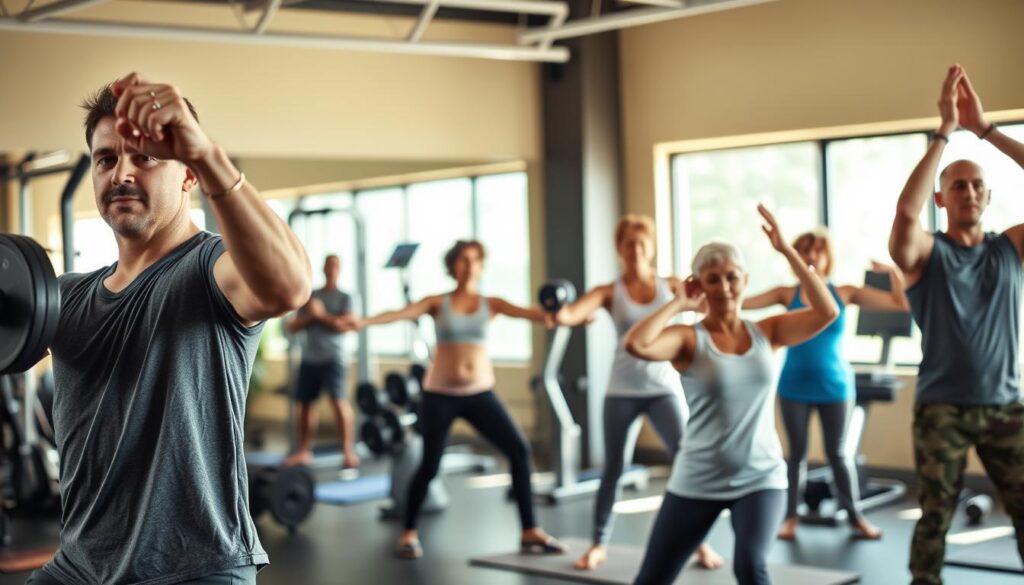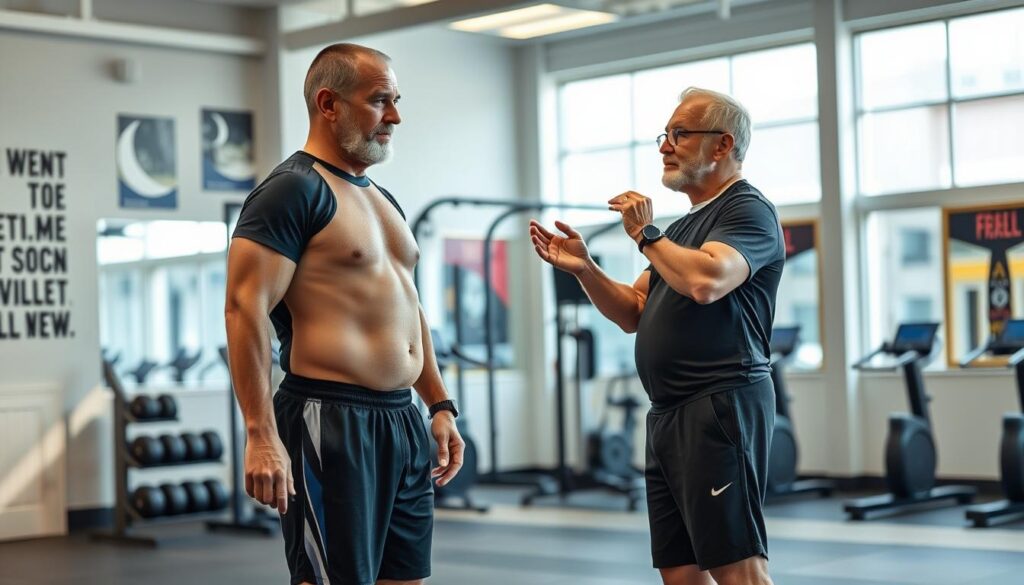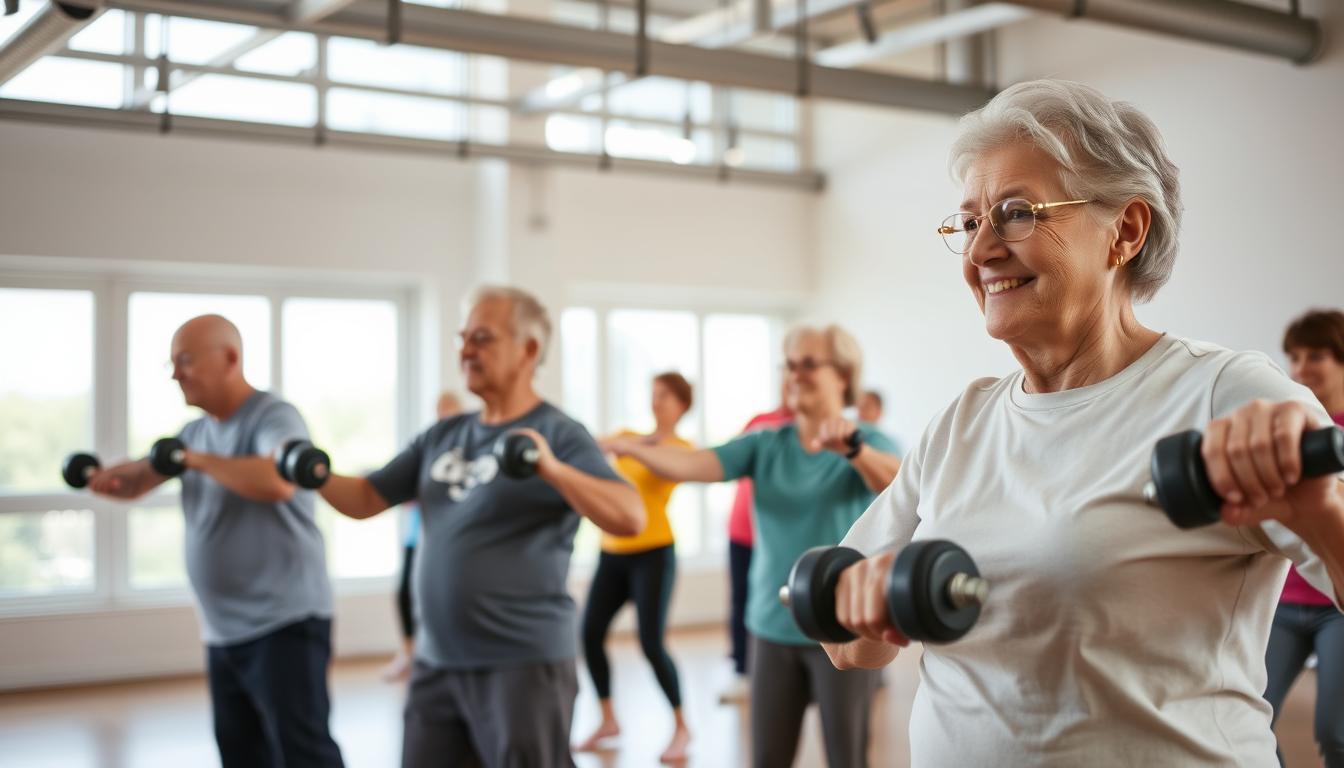Can you stay in top shape after 40? Stew Smith, a former Navy SEAL, says yes. The right training and health care are key.
As we get older, our bodies change. But with the right workouts and health habits, we can stay fit. This is especially true for those aiming for Army fitness standards. Meeting these standards is very important.
If you want to meet Army fitness standards, knowing what’s needed is vital. You also need a good exercise plan. This includes checking your body fat and fitness levels often.
Key Takeaways
- Regular exercise is crucial for maintaining fitness after 40.
- Tailored workout routines can help older adults meet Army fitness standards.
- Health maintenance is key to staying fit and performing well.
- Understanding Army body fat percentage requirements is essential.
- Regular checks help keep individuals on track with their fitness goals.
Understanding Army Fitness Standards for Older Adults
Army fitness standards are not just for the young. They help older adults stay physically fit. This is especially helpful for those over 40 with a military background.
The U.S. military focuses on overall fitness and readiness. For example, the U.S. Marine Corps tests fitness with pull-ups, running, and planks. This ensures they can do their jobs well.
What Makes Army Fitness Unique?
Army fitness is special because it tests strength, endurance, and agility. Military workout routines aim to boost fitness for military service.
“The Marine Corps’ Physical Fitness Test is a benchmark for measuring the physical capabilities of Marines, pushing them to their limits.”
Key Fitness Standards for Military Personnel
Key fitness standards include various physical tasks. For older adults, these standards help create a challenging fitness plan.
| Fitness Component | Description | Benefit for Older Adults |
|---|---|---|
| Cardiovascular Endurance | Running, swimming, or other aerobic exercises | Improves heart health and increases stamina |
| Muscular Strength | Weightlifting, push-ups, pull-ups | Enhances muscle mass and bone density |
| Flexibility and Mobility | Stretching exercises, yoga | Improves range of motion and reduces injury risk |
Older military professionals benefit from strength training for seniors. This includes weightlifting, resistance bands, and bodyweight exercises.
Exercises for older military professionals should match their fitness level and goals. It’s important to balance challenge and safety to avoid injuries.
By following army fitness standards, older adults can stay fit. This improves their health and well-being.
Benefits of Army Fitness Over40
Army fitness for those over 40 helps improve physical and mental health. It offers a structured way to boost overall well-being. Older adults can see big improvements in their health.

Enhancing Physical Health
Starting a fitness program tailored for older adults can make a big difference. It leads to:
- Improved heart health through aerobic exercises
- Stronger muscles and better endurance
- Increased flexibility and mobility
These changes can lower the risk of diseases like heart disease and diabetes.
Boosting Mental Toughness
Mental toughness is key in army fitness. Overcoming physical challenges helps build:
- Resilience in tough times
- Better focus and concentration
- More self-discipline
These mental gains can help in other life areas. They aid in managing stress and reaching personal goals.
Social Engagement and Community
Group fitness activities create a sense of community. This is especially good for older adults at risk of feeling isolated.
Joining a fitness group or community lets you:
- Make new friends and connections
- Take part in group events
- Share experiences and support each other
This support network is key for staying motivated and reaching fitness goals.
Key Components of an Effective Fitness Program
For those over 40, a good fitness plan is key to staying fit like in the military. It should mix cardio, strength training, and exercises for flexibility and mobility.
Cardiovascular Training
Cardio is vital for heart health and endurance. Try brisk walking, jogging, cycling, or swimming. The Army Fitness Test (AFT) suggests at least 150 minutes of moderate cardio each week for older adults.
Examples of Cardiovascular Exercises:
- Brisk walking
- Jogging or running
- Cycling
- Swimming
Strength Training
Strength training helps build muscle and bone, which can weaken with age. Use weights, bands, or bodyweight exercises. Focus on exercises like squats, lunges, and deadlifts, which are part of the AFT.
Key Strength Training Exercises:
- Squats
- Lunges
- Deadlifts
- Push-ups
Flexibility and Mobility Exercises
Flexibility and mobility exercises keep you moving and prevent injuries. Try yoga, Pilates, or simple stretches. Aim to stretch major muscles after workouts or 2-3 times a week.
Adding these elements to your fitness routine helps older adults reach Army fitness levels.
Tailoring Your Fitness Regimen
For those over 40, making a fitness plan that fits you is key. It’s about knowing what you need, your health, and what you want to achieve. This approach helps you reach your fitness goals.
Assessing Your Current Fitness Level
Stew Smith says it’s important to know where you stand in fitness. You should check your heart health, muscle strength, flexibility, and how well you move. Knowing this helps you see where you need to get better and track your progress.
Key components of a fitness assessment include:
- Cardiovascular endurance tests, such as a 1-mile run or a 2-mile walk
- Muscular strength evaluations, like push-ups and sit-ups
- Flexibility and mobility assessments, including range of motion exercises

Setting Realistic Goals
Setting goals that are reachable is key to staying motivated. Goals should be clear, measurable, achievable, relevant, and have a deadline (SMART). For example, you might aim to run a mile faster in 12 weeks.
Examples of realistic goals for veterans over 40 include:
- Completing a certain number of push-ups or sit-ups within a set timeframe
- Achieving a specific cardiovascular endurance milestone, like running a certain distance
- Increasing flexibility to perform daily tasks with ease
Selecting Appropriate Exercises
Picking the right exercises is crucial. You should mix cardio, strength training, and flexibility exercises. For veterans over 40, it’s best to choose low-impact exercises to avoid injuries.
Recommended exercises include:
- Brisk walking, jogging, or cycling for cardiovascular health
- Resistance band exercises or weight training for strength
- Yoga or Pilates for flexibility and mobility
Nutrition and Recovery for Enhanced Performance
Proper nutrition and recovery are key for older adults wanting to boost their physical performance and health. As we age, our bodies change how we process nutrients and recover from exercise.
A well-balanced diet is vital for older adults’ fitness goals. It should include proteins, complex carbs, and healthy fats. Protein is especially important for muscle repair and growth. Older adults should aim for 1.2 to 1.6 grams of protein per kilogram of body weight daily, especially if they exercise regularly.
Balanced Diet Essentials
A balanced diet for older adults should have a variety of foods for all necessary nutrients. This includes:
- Fruits and vegetables for vitamins and minerals
- Whole grains for complex carbohydrates
- Lean proteins for muscle repair
- Healthy fats for heart health
| Nutrient | Importance | Food Sources |
|---|---|---|
| Protein | Muscle repair and growth | Lean meats, fish, eggs, dairy, legumes |
| Complex Carbohydrates | Energy source | Whole grains, fruits, vegetables |
| Healthy Fats | Heart health and energy | Nuts, seeds, avocados, olive oil |
Hydration Tips
Drinking enough water is crucial for physical performance and health. Older adults should drink at least 8-10 glasses of water a day. They should drink more if they are doing strenuous exercise.
Monitoring hydration can be done by checking urine color. It should be pale yellow. Dark yellow or brown urine means you’re dehydrated.
Recovery Strategies
Effective recovery strategies are key for older adults to keep up with their fitness routine. This includes:
- Adequate rest and sleep
- Stretching and foam rolling to reduce muscle soreness
- Eating a post-workout meal or snack within 30-60 minutes to aid in recovery
By focusing on a balanced diet, proper hydration, and effective recovery strategies, older adults can improve their physical performance and reach their fitness goals.
Overcoming Common Barriers to Fitness
Fitness barriers like lack of time, motivation, and physical limitations are common among older adults. The Army’s fitness culture offers valuable strategies to overcome these challenges. This helps individuals stay on track with their fitness goals.
Time Management Strategies
Effective time management is key for a fitness regimen. Here are some strategies to fit exercise into your busy schedule:
- Schedule workouts in your daily planner like any other important appointment.
- Opt for shorter, high-intensity workouts if time is limited.
- Combine activities, such as walking during phone calls or doing squats while brushing your teeth.
For more tips on managing your time effectively and staying fit, visit this resource for additional guidance.
Addressing Motivation Issues
Staying motivated can be tough, but there are ways to keep going:
- Set clear, achievable goals and track your progress.
- Find a workout buddy or join a fitness group for support.
- Reward yourself for reaching milestones.
Motivation Techniques vary, but finding what works for you is key.
Physical Limitations and Modifications
Physical limitations shouldn’t stop you from exercising. Modifying exercises can help you work around limitations:
| Limitation | Modified Exercise |
|---|---|
| Knee Issues | Swimming or cycling instead of running |
| Back Problems | Low-impact aerobics or water-based exercises |
| Shoulder Injuries | Avoiding overhead presses, focusing on lower body exercises |
Tailored workouts for veterans in their 40s can be especially effective when modified for physical limitations.
Engaging with the Military Community
Connecting with the military community is key for those over 40 wanting to stay fit. It offers support, resources, and motivation. These help in reaching fitness goals.
Local Resources for Fitness
It’s important to find local resources to engage with the military community. Many military bases have fitness centers for veterans and older adults. They offer group fitness classes, personal training, and wellness workshops for older adults.
To find these resources, visit your local military base website or call the fitness center. Online forums and social media groups also offer helpful information and connections.
| Resource | Description | Benefits |
|---|---|---|
| Fitness Centers | State-of-the-art facilities with equipment and trainers | Access to professional guidance, varied workout options |
| Group Classes | Classes designed for older adults, focusing on fitness and mobility | Social interaction, motivation, tailored exercises |
| Wellness Workshops | Educational sessions on nutrition, recovery, and mental health | Holistic approach to fitness, expert advice |
Connecting with Fitness Groups
Fitness groups in the military community boost motivation and create camaraderie. They organize group runs, boot camps, and other activities for older adults.
To join, ask at your local military base or search online. Joining these activities improves fitness and builds social connections.
Participating in Events
Joining military fitness events is another way to connect. Events like military fitness challenges and veterans’ runs test fitness, meet people, and give a sense of achievement.
These events are promoted on military base websites, social media, and local veteran groups. Participating keeps individuals motivated and focused on their fitness goals.
Staying Motivated and Tracking Progress
Keeping up the pace in fitness is key, especially for those over 40 aiming for Army fitness. It’s important to stay motivated and track your progress to hit and beat your fitness targets.
Fitness Tracking Tools
Fitness apps can really boost your motivation by showing your progress clearly. They have many features, like logging workouts and personalized coaching. These help with custom workouts for veterans and others aiming for Army fitness over 40.
Milestones and Celebrations
Setting achievable milestones and celebrating small wins is a great way to stay motivated. Recognizing your progress helps you stay focused and committed to your fitness plan. This way, you can keep improving your fitness as you age.
By using these methods in your fitness routine, you can keep your motivation high. You’ll continue to move closer to your Army fitness goals.


